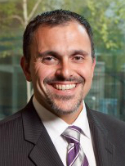Treatment of advanced uterine leiomyosarcoma with aromatase inhibitors Journal Article
| Authors: | O'cearbhaill, R.; Zhou, Q.; Iasonos, A.; Soslow, R. A.; Leitao, M. M.; Aghajanian, C.; Hensley, M. L. |
| Article Title: | Treatment of advanced uterine leiomyosarcoma with aromatase inhibitors |
| Abstract: | Background: Aromatase inhibitors are sometimes used in the treatment of selected patients with uterine leiomyosarcoma (LMS), but there are few data assessing the efficacy of aromatase inhibitors in this setting. Methods: We performed a retrospective electronic medical record review of patients with uterine LMS treated with an aromatase inhibitor at Memorial Sloan-Kettering Cancer Center between 1998 and 2008. We assessed progression-free survival (PFS) and objective response among patients with measurable disease and explored the correlation of hormone receptor status with outcome. Results: Forty patients with advanced or recurrent uterine LMS were treated with aromatase inhibitors. Thirty-four patients had measurable disease. Hormone receptor status for these patients was as follows: estrogen receptor (ER) positive-22, ER negative-9, ER unknown-3, progesterone receptor (PR) positive-10, PR negative-10, PR unknown-14. Aromatase inhibitors used were letrozole (in 74% of patients), anastrozole (21%), and exemestane (6%). Median PFS was 2.9 months (95% CI: 1.8-5.1). The 1-year PFS rate was 28% (95% CI: 11-48%) for ER and/or PR positive uterine LMS. Best objective response was partial response (PR) in 3/34 patients (9%) (all of whom were ER positive). Conclusions: In this population of patients with mostly low-volume and ER positive uterine LMS, aromatase inhibitors achieved objective response in only 9%. Relatively prolonged PFS was observed among ER positive uterine LMS patients. In the absence of a no-treatment control group, the prolonged PFS cannot be attributed solely to the activity of the aromatase inhibitor treatment since it may reflect the underlying biology of low-volume, ER positive uterine LMS. © 2009 Elsevier Inc. All rights reserved. |
| Keywords: | adult; clinical article; human tissue; treatment outcome; treatment response; aged; disease-free survival; middle aged; survival rate; retrospective studies; clinical trial; cancer recurrence; advanced cancer; cancer growth; drug efficacy; drug withdrawal; side effect; gemcitabine; adjuvant therapy; cancer patient; disease free survival; chemotherapy, adjuvant; temozolomide; cohort studies; neoplasm recurrence, local; breast cancer; aromatase inhibitor; vaginal dryness; medical record review; retrospective study; docetaxel; exemestane; arthralgia; asthenia; cancer hormone therapy; cancer center; cancer size; peripheral edema; tamoxifen; therapy effect; receptors, estrogen; receptors, progesterone; hot flush; letrozole; leiomyosarcoma; estrogen receptor; progesterone receptor; anastrozole; drug substitution; hormone receptor; aromatase inhibitors; uterine neoplasms; musculoskeletal disease; uterine leiomyosarcoma; megestrol acetate; uterus carcinoma; weight gain |
| Journal Title: | Gynecologic Oncology |
| Volume: | 116 |
| Issue: | 3 |
| ISSN: | 10956859 |
| Publisher: | Elsevier B.V. |
| Date Published: | 2010-03-01 |
| Start Page: | 424 |
| End Page: | 429 |
| Language: | English |
| DOI: | 10.1016/j.ygyno.2009.10.064 |
| PUBMED: | 19932916 |
| PROVIDER: | scopus |
| PMCID: | PMC4852374 |
| DOI/URL: | |
| Notes: | --- - "Export Date: 20 April 2011" - "CODEN: GYNOA" - "Source: Scopus" |
Altmetric
Citation Impact
BMJ Impact Analytics
MSK Authors
-
 582
582Leitao -
 257
257Zhou -
 368
368Iasonos -
 275
275O'Cearbhaill -
 290
290Hensley -
 797
797Soslow -
 615
615Aghajanian
Related MSK Work



